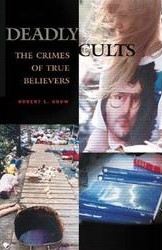
The Cult Awareness Network (CAN) was an anti-cult organization founded by deprogrammer Ted Patrick that provided information on groups it considered "cults", as well as support and referrals to deprogrammers. It operated from the mid 1970s to the mid 1990s in the United States.
A doomsday cult is a cult that believes in apocalypticism and millenarianism, including both those that predict disaster and those that attempt to destroy the entire universe. Sociologist John Lofland coined the term doomsday cult in his 1966 study of a group of members belonging to the Unification Church of the United States: Doomsday Cult: A Study of Conversion, Proselytization, and Maintenance of Faith. In 1958, Leon Festinger published a study of a group with cataclysmic predictions: When Prophecy Fails: A Social and Psychological Study of a Modern Group that Predicted the Destruction of the World.

Outrageous Betrayal: The Dark Journey of Werner Erhard from est to Exile is a non-fiction book written by freelance journalist Steven Pressman and first published in 1993 by St. Martin's Press. The book gives an account of Werner Erhard's early life as Jack Rosenberg, his exploration of various forms of self-help techniques, and his foundation of Erhard Seminars Training "est" and later of Werner Erhard and Associates and of the est successor course, "The Forum". Pressman details the rapid financial success Erhard had with these companies, as well as controversies relating to litigation involving former participants in his courses. The work concludes by going over the impact of a March 3, 1991 60 Minutes broadcast on CBS where members of Erhard's family made allegations against him, and Erhard's decision to leave the United States.
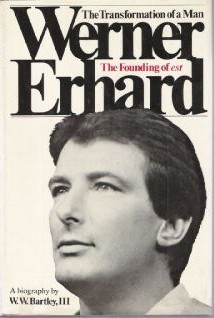
Werner Erhard: The Transformation of a Man, The Founding of est is a biography of Werner Erhard by philosophy professor William Warren Bartley, III. The book was published in 1978 by Clarkson Potter. Bartley was a graduate of Erhard Seminars Training and served on its advisory board. Erhard wrote a foreword to the book. The book's structure describes Erhard's education, transformation, reconnection with his family, and the theories of the est training.

Captive Hearts, Captive Minds: Freedom and Recovery from Cults and Other Abusive Relationships is a study of cults and abusive relationships by Madeleine Landau Tobias, Janja Lalich, and Michael Langone. It was published by Hunter House Publishers in 1994. In 2006, the book was reissued as Take Back Your Life: Recovering from Cults and Abusive Relationships.

Bounded Choice: True Believers and Charismatic Cults is a 2004 psychology and sociology book on cults by Janja Lalich. It was published by University of California Press.
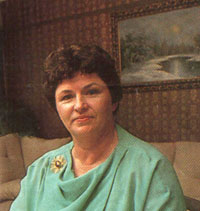
Jan Groenveld was an Australian Christian countercult activist. She was a member of the Latter-day Saints Church and the Jehovah's Witnesses. She spent fifteen years in these and other organisations before leaving them in 1975 and resolving to make more information about what she saw as "cults" available to the general public.
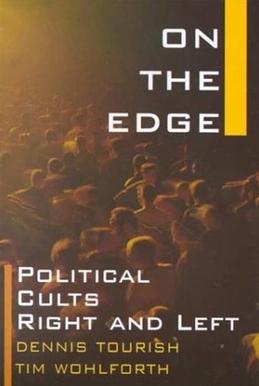
On the Edge: Political Cults Right and Left is a 2000 non-fiction book about political cults, written by Dennis Tourish and Tim Wohlforth.

Kathryn Casey is an American writer of mystery novels and non-fiction books. She is best known for writing She Wanted It All, which recounts the case of Celeste Beard, who married an Austin multimillionaire only to convince her lesbian lover, Tracey Tarlton, to kill him.

A Place of Safety is a crime novel written by English writer Caroline Graham and first published by Headline in 1999. The story follows Chief Inspector Tom Barnaby investigating the murder of a man in a village. It is the sixth volume in Graham's Chief Inspector Barnaby series, preceded by Faithful unto Death and followed by A Ghost in the Machine.
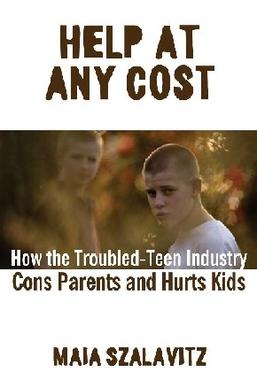
Help at Any Cost: How the Troubled-Teen Industry Cons Parents and Hurts Kids is a non-fiction book by Maia Szalavitz analyzing the controversy surrounding the troubled teen industry. The book was published February 16, 2006, by Riverhead Books. Szalavitz focuses on four programs: Straight, Incorporated, a copy of the Straight Inc. program called KIDS, North Star wilderness boot camp, and the World Wide Association of Specialty Programs and Schools. She discusses the background, history and methodology of the troubled-teen industry, including techniques drawn from attack therapy and Synanon. She uses first-person accounts and court testimony in her research, and states that no evidence exists proving that these programs are effective. The book also includes advice for parents and an appendix with additional resources on how to get responsible help for teenagers.

Cyber Rights: Defending Free Speech in the Digital Age is a non-fiction book about cyberlaw, written by free speech lawyer Mike Godwin. It was first published in 1998 by Times Books. It was republished in 2003 as a revised edition by The MIT Press. Godwin graduated from the University of Texas School of Law in 1990 and was the first staff counsel for the Electronic Frontier Foundation. Written with a first-person perspective, Cyber Rights offers a background in the legal issues and history pertaining to free speech on the Internet. It documents the author's experiences in defending free speech online, and puts forth the thesis that "the remedy for the abuse of free speech is more speech". Godwin emphasizes that decisions made about the expression of ideas on the Internet affect freedom of speech in other media as well, as granted by the First Amendment to the United States Constitution.

Generation Loss is a 2007 novel by American writer Elizabeth Hand.
Digital Copyright: Protecting Intellectual Property on the Internet is a 2000 book by Jessica Litman detailing the legislative struggles over the passage of the Digital Millennium Copyright Act. It was widely reviewed and is generally cited as the definitive history of the DMCA's passage, as well as an exemplar of the lobbying and jockeying around passage of contemporary copyright legislation. Karen Coyle noted that
this is not a law book, although it is about law. Digital Copyright is instead a social history of copyright law. It is not about the law per se but about how the technology developments of the 20th century changed how copyright law is crafted in the United States and who reaps the benefits.
The Winner's trilogy is a trilogy of young adult fantasy novels by Marie Rutkoski, which includes The Winner's Curse (2014), The Winner's Crime (2015), and The Winner's Kiss (2016), as well as the short story prequel, Bridge of Snow (2014).

The Fellowship of Friends, also known as Living Presence and the Fourth Way School, is a new religious organization which is non-denominational that has been labelled as a cult by critics, ex-members and some academics.

Sadie is a novel written by Courtney Summers. The book was released on September 4, 2018, and is told from two perspectives: some chapters offering Sadie's point of view and some chapters being styled as transcripts from a podcast called "The Girls" hosted by a man named West McCray. The release of the book was accompanied by the release of a mock true-crime podcast titled The Girls: Find Sadie which is available on Apple Podcasts and Stitcher.

A Place Called Waco: A Survivor's Story is the memoir of Waco siege survivor David Thibodeau. He co-authored it with novelist Leon Whiteson (1930–2013). It was originally published in 1999 by PublicAffairs, and it was re-released by Hachette Books in 2018 with the title Waco: A Survivor's Story as a revised and updated version. It corresponded with the release of Waco, a 2018 miniseries partially inspired by Thibodeau's account. Aviva Layton co-authored the re-release with Thibodeau and Whiteson. Robert Fass narrated the audiobook version of Waco: A Survivor's Story. According to Publishers Weekly, the book was originally rejected by over 20 publishing houses before reaching PublicAffairs.

Why Waco?: Cults and the Battle for Religious Freedom in America is a 1995 non-fiction book written by James D. Tabor and Eugene V. Gallagher on the Waco siege and the anti-cult movement in America. It was published by the University of California Press. The same press reprinted it in 1997 in paperback. The appendix of the book contains an unfinished manuscript written by David Koresh, the leader of the Branch Davidians, on the Seven seals in the Book of Revelation. The appendix has a preface written by Tabor and J. Phillip Arnold. The manuscript was obtained from a survivor of the fire, Ruth Riddle. The final pages of the book provide a list of Branch Davidians who died in the 28 February 1993 raid, the 19 April 1993 fire, and who survived.

Sacred Suicide is a 2014 edited volume about suicide and religion, particularly as it relates to cults or new religious movements. It was published by Ashgate and edited by James R. Lewis and Carole M. Cusack, part of the Ashgate New Religions series. Other contributors to the book include Nachman Ben-Yehuda, Mattias Gardell, and Thomas Robbins. It is divided into five sections.
